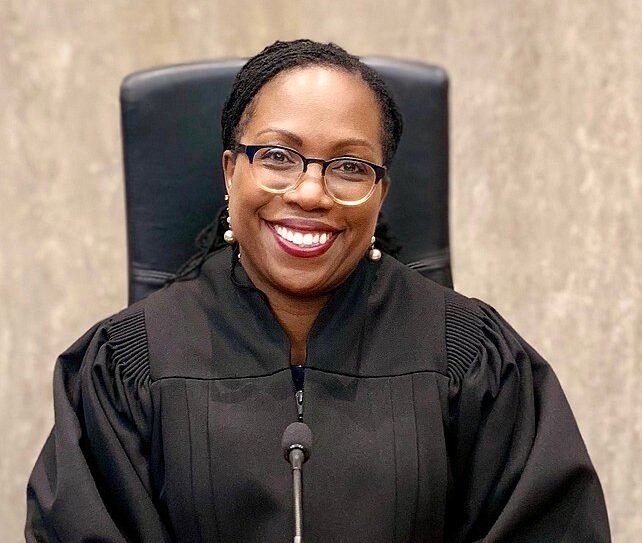Following the retirement of Justice Stephen Breyer, President Biden promised to nominate an African-American woman to replace his position on the Supreme Court. After a rigorous search, he nominated Judge Ketanji Brown Jackson. And now, following days of confirmation hearings, the Senate has confirmed Judge Jackson, meaning she will be the first Black woman to ever serve on the Supreme Court.
Jackson has long been under consideration as a potential Supreme Court justice pick, as she has uniquely extensive experience. A year ago, she was even chosen to replace the now Attorney General Merrick Garland on the D.C. Circuit Court of Appeals, which is considered the second most important court in the U.S.
Although people in government have some conflicting views of Jackson, it is almost universally believed by politicians that she is a highly qualified and experienced legal expert with an exceptional character. Even Justice Breyer, who she is nominated to replace, spoke of her as “brilliant” and a “mix of common sense” and “thoughtfulness” when she was being chosen for her prior job of a federal trial court judge.
Jackson was born in Washington D.C. in 1970, but then moved as a young girl and grew up in Miami, Florida. Her parents were both school teachers who served as inspirations to Jackson for their hard work and perseverance. Her father went to law school when she was young, and Jackson recalls watching him spend nights studying for difficult examinations and Socratic questioning while she was doing her preschool homework, instilling in her a love for law. He went on to become the chief attorney for the Miami-Dade County School Board, while her mother became a principal for 14 years.
At school, Jackson already stood out as a student with high potential. While attending Palmetto Junior High School, she was selected as the school “mayor.” She then went on to have even more success in high school, where she soared on the school’s speech and debate team and even became a national champion at her speech competitions. Jackson was also elected student body president and was voted “most likely to succeed.” While on a visit to Harvard University for a speech competition, she was inspired to apply to the school. When Jackson spoke to her guidance counselor about her aspirations of attending Harvard, though, the guidance counselor told her not to aim too high. Jackson enrolled at Harvard in 1988.
Jackson graduated magna cum laude from Harvard University. She then went on to attend Harvard Law School where she graduated cum laude and was also an editor of the Harvard Law Review. While at Harvard, Jackson met her now husband Patrick Jackson. They have been married for 25 years and together they share two daughters.
Following her graduation, Jackson held a wide variety of legal positions. From 1996-1998, she served as a clerk for several president-appointed judges. She then got a highly sought-after job as an associate at Miller Cassidy Larroca & Lewin, a prominent litigation firm based in Washington. Jackson worked at the firm for a year, leaving to serve as a clerk for the retiring Justice Breyer during a 1999-2000 term. These positions are common for a Supreme Court Justice to have held, but she also has the very unique experience of being a public defender. From 2005-2007, she worked as a federal public defender in Washington D.C., representing people who could not afford a lawyer. While there she says she gained valuable knowledge that she used when she later became a trial judge. Jackson will be the first federal public defender to sit on the Supreme Court.
In 2010, Jackson was nominated by President Obama to serve as vice chair of the U.S. Sentencing Commission, and was confirmed by the Senate with unanimous consent. She then started her time as a federal judge when she was nominated by Obama in 2013 to serve as a U.S. district judge in Washington D.C, where she made several high profile rulings. Following a seven year tenure there, she was nominated by President Biden to the D.C. Circuit Court of Appeals in 2021, and was supported by politicians and legal colleagues across the political spectrum.
Prior to Jackson’s confirmation to the Supreme Court, she had to sit for days of confirmation hearings in the Senate. As revealed by the nature of questions asked by the Senators, Jackson is widely approved by Democrats, but widely disapproved of by Republicans, even though she is universally believed to be a well qualified nominee. Republicans base their disapproval mostly on the handling of specific cases and clients, and some believing that she will be partial and left-leaning. Jackson of course insists that she has and will continue to remain partial with her rulings. Senator Lindsey Graham was a potential Republican vote for Jackson as he supported her confirmation to the D.C. Circuit, but opposed her confirmation to the Supreme Court. He said that while she has “exceptionally good character” she is at times liberal and lenient. Democrats cite her overall excellent credentials and experience in their support of her.
Jackson is one of the most popular justices to be nominated to the Supreme Court in the 21st century. Only 26% of Americans are opposed to her confirmation, as the most popular nominee since Justice John Roberts was elected in 2005. Jackson has managed to garner the kind of public support that has been rarely seen since the 90s. Democratic Senator Dick Durbin said “Justice Jackson will bring to the Supreme Court, the highest level of skill, integrity, civility and grace. This committee’s action today is nothing less than making history.
You may also like:
-
Golden Globes 2024: Hollywood’s typical night of fun turned sour
-
Second Chapter: Gypsy Rose Blanchard navigates new life after prison
-
Executives transform stuffed animals with a plushy revolution
-
Man Attempts to Cross Atlantic Ocean in a Homemade Hamster Ball
-
The Paqui One Chip Challenge has returned with deadly results
